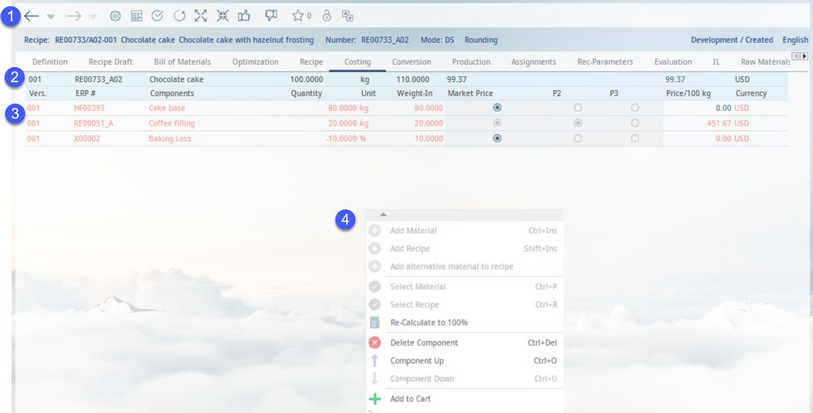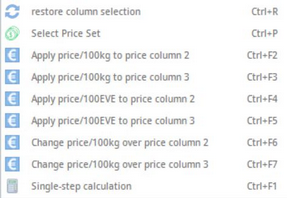In this dialog, you can view and modify all recipe components with corresponding prices and price set settings (customer-specific).
1)Module toolbar:
Aside from the usual taskbar buttons referred to to in Recipe → Functions & Processes → Basic Recipe Functions, the Costing taskbar has different functions as follows:
1.Expand: Display sub-recipes. This icon has to be enabled via a designated program parameter.
2.Collapse: Hide all sub-recipes. This icon has to be enabled via a designated program parameter.
2)Predefined units/price sets: Determined in the Definition tab. This line also contains information about the recipe such as its ID number.
3)Ver.: The release version of the component.
ERP no.: The ID from Master data/Definition → field ERP no..
Components: The component names.
Quantity: Enter the component quantity here. The interim total and total are calculated automatically. The number above this field is the base quantity (from Definition).
Unit: You can select and add the unit here. The unit above this field is the base quantity unit (from Definition).
Weigh-in: The weight without any losses.
Market Price: The price calculation on price 1 (*column setting M).
Price column 2: The price calculation on price 2 (*column setting P).
Price column 3: The price calculation on price 3 (*column setting P3).
Right-click on one of the three columns to display additional options:
Restore column selection: All prices in one column can be selected at once by clicking on the column header. This option restores the previous price settings.
Select price set: Select from predefined price sets.
Apply price/100kg: Apply component price/100kg.
Apply price/100EVE: Apply component line price.
Change price/100kg: Enter the price manually.
Single-step calculation: Recipe is calculated only on its first level = there is no summation of material values of the sub-recipes.
Price/100 kg: The component price per 100 kg.
Currency: The default price currency.
4)Right-click context menu:
The tabs Recipe, Costing, and Conversion share the same context menu. Only the options relevant to this tab are described below.
Recalculate to 100%: When the quantities of individual components change, their sum does not equal the base quantity as defined in Recipe → Definition. This function adjusts the base quantity to correspond with the sum of the components (i.e. the components will make 100% of the recipe).
Delete component: Delete selected component.
Component upwards: Move selected component upwards.
Component downwards: Move selected component downwards.
Add to cart: Insert material components into a cart.
Cart: Opens the dialog Cart. Each added material component is now visible in the cart.
Display Master Data: Jumps to the Definition tab of the Master data object or recipe.
Comment: Save a comment for the selected component. However, this can also be done directly by entering a text in the blank text field.
Production loss: Assign production loss to the Master data price in percentages.
Edit columns: Show or hide columns. It is also possible to rename columns by double-clicking on their name.
For more information about Price sets, see Recipe → Functions & Processes → Using price sets.
|
Note: Unreleased recipe components are displayed in a different color (by default red). The color can be defined separately for Master data objects and Recipes using designated program parameters. |


